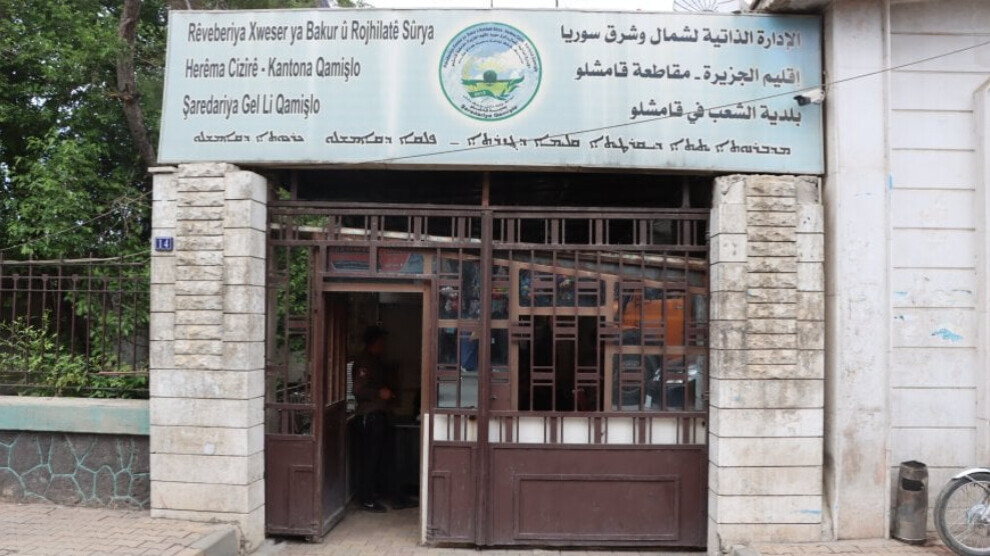Women Protect the Environment Through Democratic Municipalities
In the Jazira region of the Autonomous Administration of North and East Syria, women play an active role in municipal work, contributing to the protection of the environment and life through a democratic administrative model.

Ronida Haji
Al-Hasakah — In the Autonomous Administration of North and East Syria, where women have faced war and crises for over fourteen years, their role is not limited to rebuilding life—it extends to protecting the environment. In the Jazira region, municipalities adopt a democratic environmental model that empowers women, based on the philosophy of Leader Abdullah Öcalan.
Under this approach, municipalities are not merely central governmental institutions, but independent spaces that pulse with the will of the people, women, and communities. Through this model, women reshape municipalities as centers for environmental and life protection, embodying the spirit of resistance and social and environmental justice.
Leader Öcalan emphasizes in his definition of democratic freedom the necessity of organizing municipalities through communes and councils. This model has been implemented in the municipalities of North and East Syria under women’s leadership, ensuring equal representation in decision-making. Municipalities do not merely provide technical services—they also set policies that promote the environment, society, and women’s freedom.
Berivan Omar, Co-Chair of the Union of Municipalities in Jazira, emphasized the importance of environmental protection, highlighting the crucial role local leaders must play in ensuring a healthy and sustainable environment for all. She drew attention to the deep historical connection between women and nature, considering women the foremost defenders of the environment. Amid capitalist policies that continue to destroy cities and nature, women lead municipal projects aimed at building harmonious, clean, and sustainable cities.
Women and the Environment: Local Leadership Towards Sustainable Development
Berivan Omar noted that the capitalist system has corrupted human life, while women strive to build a new balance between humans and nature in response to this system. "Throughout history, power has been linked to the domination of both nature and women; yet, women cannot be separated from nature. We see women in political spheres as the foremost defenders of the environment."
She added that as local leaders, women work to achieve harmony between civic life, urban expansion, and nature, responding to the multiple crises left by capitalist life and major cities. "This approach is reflected in municipal efforts, particularly through the Women’s Office, which continuously seeks to enhance green spaces, increase cleaning efforts, and focus on the environment in general."
“Women Are More Connected to Nature and Protective of It”
Berivan Omar pointed out that the co-chair system and women’s representation in municipal councils have given women an active role in decision-making. This change has strengthened women’s participation in environmental, agricultural, and sanitation issues since 2012, especially following the establishment of the Autonomous Administration.
She explained that women have provided significant support in developing these areas, and their efforts continue today. This system enables women to have a direct impact within municipal councils, where their presence in discussions is influential, especially when they hold a majority, making their opinions central to all parties involved.
Omar emphasized the importance of women’s role in decision-making, noting that their decisions often have a positive and effective impact, particularly when analyzed from a perspective that considers the future of women and children, making them more inclusive and sustainable.
She added that this approach differs from male-led decisions, which often focus only on the technical aspects of construction and urban planning. The co-chair system ensures the continuity of this balance, with women participating in over 50% of municipal work, enhancing their presence and ensuring broader protection of community interests.
“Women in Municipalities: A Powerful Voice in Environmental Decision-Making”
Berivan Omar stressed the importance of having a Women’s Council and a dedicated environmental platform within the Union of Municipalities. This organizational framework ensures that women’s projects reflect their visions and respond to community needs. "The Women’s Council within the Union of Municipalities was established, with offices organized to focus projects on building clean and beautiful cities and making effective environmental protection decisions."
She noted that women’s participation in these platforms often stems from a deep belief in the importance of environmental protection and the necessity of coexistence among all living beings, enhancing the prospects of sustainable nature preservation.
Omar pointed out that municipalities play a pivotal role in serving the community. "Their establishment was one of the first steps in building the Autonomous Administration system, which forms the foundation of local governance."
She highlighted the law issued in 2024, particularly Article Four, which grants expanded powers to local officials, enhancing their ability to provide better services. "This expansion requires municipalities, when proposing any project, to organize participatory meetings involving all relevant parties from municipalities, councils, committees, and organizations to ensure project implementation aligns with community needs." She confirmed that the role of local leadership has significantly evolved, and community services have become more effective and organized thanks to this participatory decision-making model.
“Environmental Protection: A Collective Responsibility and a Necessity”
Berivan Omar emphasized that trust in local leadership is fundamental to successful municipal work, stressing the importance of community involvement in all municipal activities. "We cannot achieve effective results without the support and participation of residents in project implementation. Without this interaction, we cannot meet the city’s needs or work according to its requirements."
She added that building trust between citizens and local officials is essential because the people lead the municipality, and municipal employees implement the decisions made by the community itself.
In conclusion, Berivan Omar underscored that environmental protection is not merely an option but a fundamental necessity to ensure human health and the development of civic life, affirming that environmental preservation should be at the heart of any developmental or urban project.
